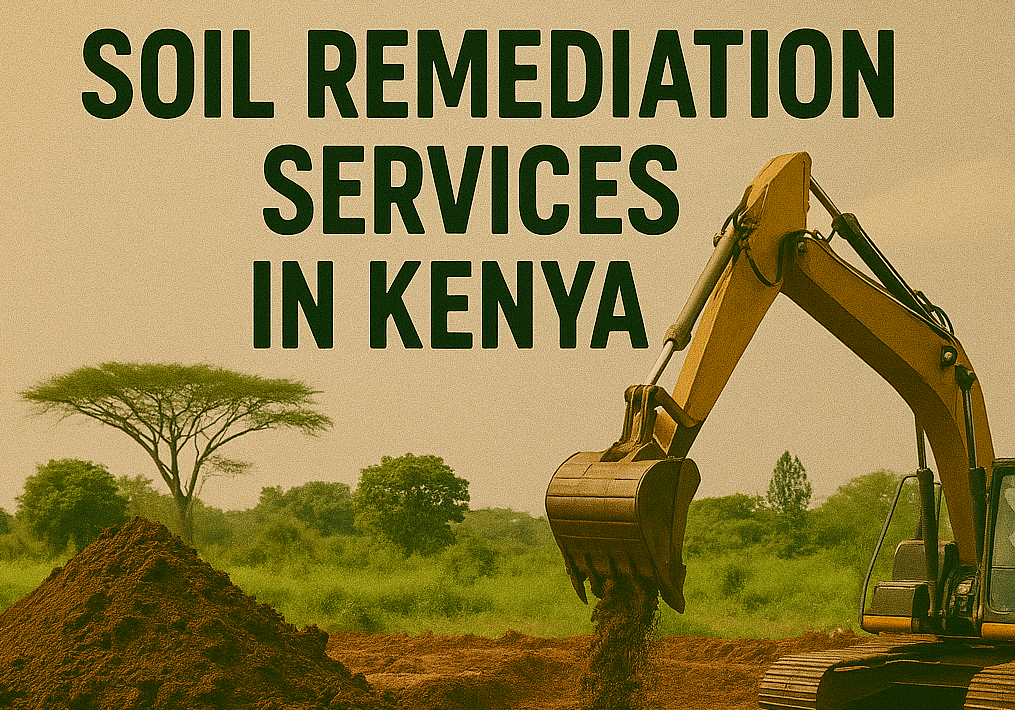Restoring Land and Protecting Water
Introduction
Kenya, with its fertile highlands, arid northern regions, and fast-growing urban centers, is confronting a critical environmental challenge soil and groundwater contamination. Agriculture drives much of the nation’s economy, but rapid industrialization, oil exploration, mining, and unplanned urban growth have put increasing pressure on fragile soil systems and limited freshwater reserves. From pesticide runoff in the Rift Valley to industrial waste around Nairobi and Mombasa, soil degradation is threatening food security, public health, and long-term sustainability.
At The Ground Water Company, we provide specialized soil remediation services across Kenya. Our mission is to restore contaminated land, protect aquifers, and help industries, municipalities, and communities comply with environmental standards while contributing to Kenya’s long-term vision for sustainable development.
What Is Soil Remediation?
Soil remediation is the process of cleaning up and restoring contaminated soil to make it safe for people, plants, and animals. It’s commonly used at sites where industrial activities, chemical spills, or improper waste disposal have polluted the ground.
In Kenya, the most common soil contaminants include:
- Petroleum hydrocarbons – from oil storage, transport, and exploration activities in regions like Turkana
- Heavy metals – from mining operations, tanneries, and industrial effluents
- Chemical residues – from pesticides, fertilizers, and untreated industrial waste
- Salinity and nitrates – caused by irrigation practices and agricultural runoff in semi-arid counties
Soil Contamination Challenges in Kenya
Kenya’s geography and economy create unique contamination pressures:
- Oil & Mining Activities – Exploration in Turkana and mineral extraction in coastal and western regions contribute to hydrocarbon and heavy metal pollution.
- Industrial Expansion – Nairobi’s industrial zones and Mombasa’s port-related activities generate waste and effluents that impact soil and groundwater.
- Urban Growth – Rapid expansion in cities increases landfill pressures, sewage mismanagement, and construction-related waste.
- Agricultural Practices – Overuse of fertilizers and pesticides in the Rift Valley and other farming regions contaminates soil and reduces productivity.
- Water Scarcity – With drought-prone regions depending heavily on groundwater, even localized contamination has long-lasting effects.
Our Soil Remediation Services in Kenya
At GWC, we develop solutions tailored to Kenya’s diverse landscapes and environmental conditions:
- Site Assessment & Soil Testing
Soil sampling and analysis to identify contaminants
Risk assessment for human health and environment
Geotechnical surveys to understand soil structure
- Excavation & Disposal
Removal of contaminated soil
Transport to licensed disposal facilities
Landfill management or off-site treatment
3.In-Situ Remediation Services
Bioremediation (using microbes or plants)
Chemical oxidation/reduction
Soil vapor extraction
Phytoremediation
4.Ex-Situ Remediation Services
Soil washing
Thermal desorption
Stabilization
5.Water Treatment
Pump and treat systems
Permeable reactive barriers
Containment systems
6.Monitoring & Reporting
Post-remediation soil testing
Environmental monitoring
Regulatory reporting and documentation
Why Soil Remediation Matters in Kenya
- Protects Groundwater Security – Safeguards aquifers essential for millions of Kenyans, especially in arid and semi-arid regions
- Restores Agricultural Productivity – Ensures farmland remains fertile in a country where agriculture sustains the majority of livelihoods
- Supports National Goals – Aligns with Kenya’s Vision 2030 and environmental sustainability commitments
- Ensures Compliance – Meets national environmental regulations and international best practices
- Protects Public Health – Reduces exposure to toxins and improves soil quality for both rural and urban communities
Other Ground water Services We Provide in Kenya
Alongside soil remediation, GWC offers a comprehensive suite of groundwater services:
- Ground water exploration
- Ground water recharge
- Ground water contamination
- Dewatering solutions
- Flooding solutions
- Hydrological studies
- Ground water seepage
- Ground water remediation
- Flood risk assessment
Conclusion
Kenya’s reliance on agriculture, rapid industrial expansion, and growing cities make soil and groundwater protection a national priority. Tackling contamination is not just an environmental responsibility it is essential for food security, public health, and sustainable economic growth.


